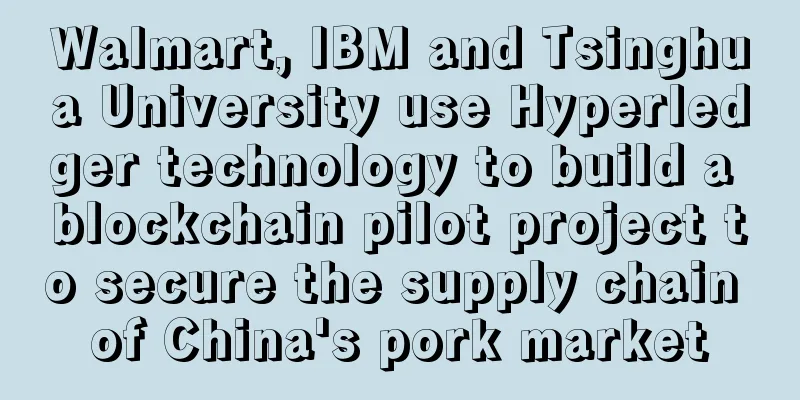Walmart, IBM and Tsinghua University use Hyperledger technology to build a blockchain pilot project to secure the supply chain of China's pork market

|
Walmart has developed a blockchain pilot project for China's massive pork industry supply chain. The project was created by Walmart in partnership with IBM and Tsinghua University in Beijing, and is part of two separate and parallel efforts by the Chinese government and Walmart to make supply chain data more accurate and secure. Paul Chang, head of IBM's global supply chain solutions, explained that the pilot project, once implemented, will also allow Walmart to share in the profits of China's lucrative pork market. Chang told CoinDesk:
China is expected to consume 54.6 million tons of pork this year, according to the USDA, a slight decrease from previous forecasts due to rising pork prices. For example, according to a Wharton report last year, pork prices in China are directly linked to food safety issues — something that Walmart's program is targeting. The pilot was announced today as Walmart launched its new Walmart Food Safety Collaboration Center in Beijing, which aims to increase transparency in China’s food system, including blockchain. Rags to RichesTo create the pilot project, a Walmart team comprised of supply chain employees, logistics and food safety experts in China partnered with Tsinghua University’s National Engineering Laboratory for E-Commerce Technology. The project, which uses technology from the Hyperledger blockchain project, is being pitched as a way to ensure the accuracy of agricultural production details, batch numbers, factory and processing data, expiration dates, storage temperatures and shipping details. Initially, the pilot will run on three nodes, one managed by IBM, one by Walmart and one by a supplier Chang said he didn’t want to name. But to give an idea of how big those suppliers could get, the 15-year supply chain traceability veteran said the industry could save “billions of dollars” when the program scales to 10 nodes. That’s because by then, every food product sold in Walmart stores will be authenticated and a transparent and secure record will be created using this blockchain system. Records created on a distributed ledger could also help retailers better manage when products are on the shelf in each store, according to the statement. A more secure supply chainFollowing several reports on contamination in China's food and drug industry, the China Food and Drug Administration proposed earlier this year to adopt measures to improve product traceability. Although in today's announcement the Chinese government described its push for tighter supply chain controls as a 'critical step' to eliminate pollution, increased regulation is often accompanied by higher prices. In May, a report in the South China Morning Post said that China's regulation of infant formula was seen as increasing competition and reducing incomes. With estimates that $1 trillion could be saved by moving global supply chains to blockchain, Walmart aims not only to help China create a safer food market but also to cut costs. Tracking Mango ShipmentsHowever, Chang said IBM is making good progress on another effort to apply lessons learned from the Wal-Mart project to an entirely different industry. He described an ongoing, yet unannounced project to transport mangoes on a 'small scale' but 'very extensive in terms of the number of organisations involved'. Chang said:
He expects IBM and its competitors in the blockchain supply chain space to be able to move from one commodity to another. He concluded:
|
<<: Beijing and Shanghai’s blockchain competition
>>: After the hard fork, ETH contracts suffered another round of attacks
Recommend
The Federal Reserve raised its inflation expectations, Bitcoin failed to stop falling, and Ethereum continued to be weak
On Wednesday, the Federal Reserve announced that ...
Is it good to have wrinkles on the forehead?
It is not difficult to find out through careful o...
Good men in the entertainment industry
Good men in the entertainment industry In many pe...
Physiognomy analysis: whether the couple is likely to divorce
Love and marriage are two different things. Altho...
Is it good for people with moles on their thumbs to have good luck? Is it a destiny of wealth and honor?
As one of the traditional physiognomy techniques, ...
What is the fate of a woman with a high nose? What kind of nose is good for face reading?
People's nose is really important. In daily l...
Fingerprints reveal your destined love
Fingerprints reveal your destined love No two peo...
Bitcoin Core Chief Code Maintainer: 3 Plans to Decentralize Bitcoin Development
Note: The original author is Wladimir van der Laa...
How to tell the face of a bad man
A person's good and evil will be reflected in...
Will a woman with hanging needle lines live longer? What kind of facial features will make a woman live longer?
In real life, we can see some women with hanging ...
Speculations on the development of blockchain technology in China
The disruptive nature of financial technology inn...
What kind of palmistry will bring you wealth and honor?
What kind of palmistry will bring you wealth and ...
What are good lines and what are their effects?
We may have various lines on our faces and the sa...
What does it mean for a woman with bad ears? A complete guide to ear readings!
Ears are one of the five senses that bring us sou...
Triangle palm print
There are all kinds of palm lines on our hands, s...









